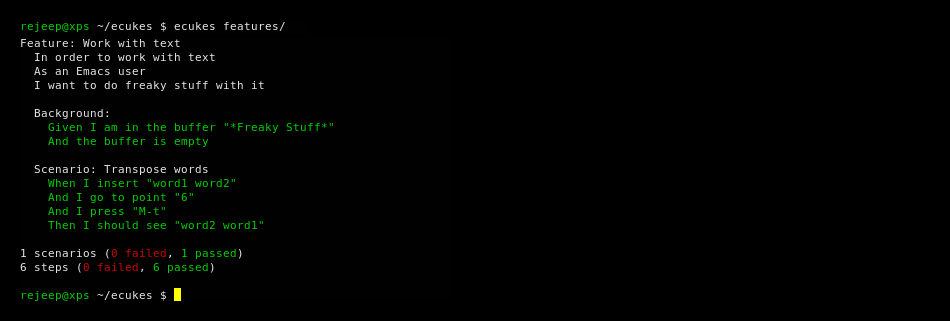Ecukes - Cucumber for Emacs
I just finished the first release of a project of mine called Ecukes. Ecukes is a package for Emacs that makes it possible to write Cucumber like tests for Emacs packages.
This release includes the most basic parts of Cucumber and I would consider it usable, but still under development.
To give you an example of what you can do with Ecukes, check out this example:
Feature: Work with text
In order to work with text
As an Emacs user
I want to do freaky stuff with it
Background:
Given I am in the buffer "*Freaky Stuff*"
And the buffer is empty
Scenario: Transpose words
When I insert "word1 word2"
And I go to point "6"
And I press "M-t"
Then I should see "word2 word1"
# ...Each step needs to be translated with a step definition. These are the steps for the feature above. All these steps are however already in Espuds, which is a collection of commonly used step definitions.
(require 'edmacro)
(When "^I press \"\\(.+\\)\"$"
(lambda (keybinding)
(execute-kbd-macro (edmacro-parse-keys keybinding))))
(Given "I am in the buffer \"\\(.+\\)\""
(lambda (buffer)
(switch-to-buffer (get-buffer-create buffer))))
(And "the buffer is empty"
(lambda ()
(erase-buffer)))
(When "I insert \"\\(.+\\)\""
(lambda (contents)
(insert contents)))
(And "I go to point \"\\(.+\\)\""
(lambda (point)
(goto-char (string-to-number point))))
(Then "I should see \"\\(.+\\)\""
(lambda (should-see)
(let ((actual (buffer-substring-no-properties (point-min) (point-max)))
(expected should-see))
(assert
(search expected actual) nil
(concat "Expected \"" actual "\" to include \"" expected "\"")))))This is how running the feature looks like:

Check out Ecukes website and the source code.
You might also want to check out two Emacs packages of mine that are tested with Ecukes:
- Drag Stuff - http://github.com/rejeep/drag-stuff
- Wrap Region - http://github.com/rejeep/wrap-region
blog comments powered by Disqus Back to Top

